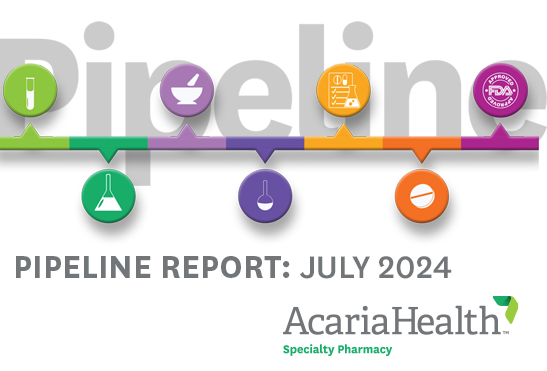Pipeline Report
New AcariaHealth Pipeline Report - July 2024
07/30/2024

A highly notable FDA action this past quarter that piqued the interest of many was a broadly expanded indication for the use of ELEVIDYS (delandistrogene moxeparvovec-rokl) for the treatment of Duchenne muscular dystrophy (DMD). Elevidys is now approved for use in most DMD patients aged at least 4 years, whether ambulatory or not. This is a much larger population than that for which Elevidys was originally approved, which was for only those 4 through 5 years of age who are ambulatory. The FDA approval was granted against the backdrop of a range of clinical data that left some unconvinced, but which also spoke to the agency’s desire to exercise its regulatory flexibility to help fill a large unmet need.
Also noteworthy are the FDA’s recent approvals of OHTUVAYRE (ensifentrine) for the treatment of chronic obstructive pulmonary disease (COPD) and KISUNLA (donanemab-azbt) for the treatment of early Alzheimer’s disease. Ohtuvayre is intended for use as maintenance therapy in people who remain symptomatic despite use of existing therapies. It represents the first new mechanism of action to be approved for use in COPD in over two decades. Kisunla is not the first agent of its kind to be approved for this indication, as LEQEMBI (lecanemab-irmb) is already approved. Kisunla is, however, the first to have been examined for potential differential efficacy based on tau levels, which for now is mostly just of academic interest but which is auspicious for the future of dementia care. Kisunla is also the first to be approved with labeling that supports early discontinuation of therapy based on amyloid response. This, among other factors, will have implications for its treatment acceptability and ultimate market uptake relative to Leqembi.
As we look forward into the upcoming months, we see potential FDA approvals for more cell and gene therapies. ADP-A2M4 (afamitresgene autoleucel) is a T-cell therapy that targets a rare soft tissue sarcoma, delving further into the realm of cell therapies for solid cancers. AUTO1 (obecabtagene autoleucel) is T-cell therapy that aims to provide better tolerability than other available T-cell alternatives for acute lymphoblastic anemia, representing an important advance in the treatment of this hematologic cancer. And finally, an FDA review date has been secured for gene therapy UPSTAZA (eladocagene exuparvovec) which would be the first FDA-approved therapy for the treatment of AADC deficiency, an ultra-rare disorder which affects the nervous system and has wide-ranging effects on motor and cognitive function. All three of these therapies hold the promise of better outcomes for the patients that they are intended to treat.
Alan R. Smith, MD
Vice President, Medical Director
Our quarterly publication is developed by our Clinical Pharmacy Drug Information team to provide additional drug pipeline information and insights to help health care leaders prepare for shifts in prescription drug management. Learn more by accessing the complete AcariaHealth July 2024 Pipeline Report (PDF).
